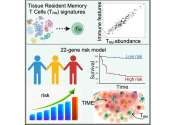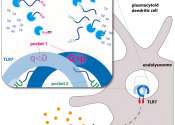Personalized mRNA vaccines: A new approach in melanoma treatment
A personalized mRNA vaccine to treat melanoma has now reached late-stage trials in the UK. This is just the latest step in improving the cure rate of cancer.
21 hours ago
0
0
A personalized mRNA vaccine to treat melanoma has now reached late-stage trials in the UK. This is just the latest step in improving the cure rate of cancer.
21 hours ago
0
0

Inulin, a type of fiber found in certain plant-based foods and fiber supplements, causes inflammation in the gut and exacerbates inflammatory bowel disease in a preclinical model, according to a new study by Weill Cornell ...
May 3, 2024
1
177

The Wistar Institute assistant professor Filippo Veglia, Ph.D., and team, have discovered a key mechanism of how glioblastoma—a serious and often fatal brain cancer—suppresses the immune system so that the tumor can grow ...
May 3, 2024
0
50

Activated T cells that carry a certain marker protein on their surface are controlled by natural killer (NK) cells, another cell type of the immune system. In this way, the body presumably curbs destructive immune reactions.
May 3, 2024
0
27

The first panoramic view of infection pathways in the human placenta has been created, which could highlight potential drug targets to develop pregnancy-safe therapies for malaria, toxoplasmosis and listeria, all diseases ...
May 3, 2024
0
2

A drug that targets a protein known as phosphatidylserine boosted the response rate for hepatocellular carcinoma (HCC) patients receiving immunotherapy without compromising their safety, according to results of a phase two ...
May 3, 2024
0
52

Acute myeloid leukemia (AML) is a type of blood cancer that forms in the soft marrow of the bones, typically attacking cells that would otherwise form the key component of the body's immunodefense system, white blood cells.
May 3, 2024
0
13

An extensive analytical study conducted at the Terasaki Institute for Biomedical Innovation (TIBI) has revealed an association between favorable survival outcomes for melanoma patients and the presence of higher populations ...
May 2, 2024
0
1

LMU researchers have deciphered the complex interplay of various enzymes around the innate immune receptor toll-like receptor 7 (TLR7), which plays an important role in defending our bodies against viruses.
May 2, 2024
0
5

Findings from a new study, led by researchers at Dartmouth's Geisel School of Medicine and published in Nature Immunology, have uncovered key functional differences in macrophages—a type of white blood cell that plays a ...
May 2, 2024
0
16

Immunity is a biological term that describes a state of having sufficient biological defenses to avoid infection, disease, or other unwanted biological invasion. Immunity involves both specific and non-specific components. The non-specific components act either as barriers or as eliminators of wide range of pathogens irrespective of antigenic specificity. Other components of the immune system adapt themselves to each new disease encountered and are able to generate pathogen-specific immunity.
Adaptive immunity is often sub-divided into two major types depending on how the immunity was introduced. Naturally acquired immunity occurs through contact with a disease causing agent, when the contact was not deliberate, whereas artificially acquired immunity develops only through deliberate actions such as vaccination. Both naturally and artificially acquired immunity can be further subdivided depending on whether immunity is induced in the host or passively transferred from a immune host. Passive immunity is acquired through transfer of antibodies or activated T-cells from an immune host, and is short lived, usually lasts only a few months, whereas active immunity is induced in the host itself by antigen, and lasts much longer, sometimes life-long. The diagram below summarizes these divisions of immunity.
This text uses material from Wikipedia, licensed under CC BY-SA